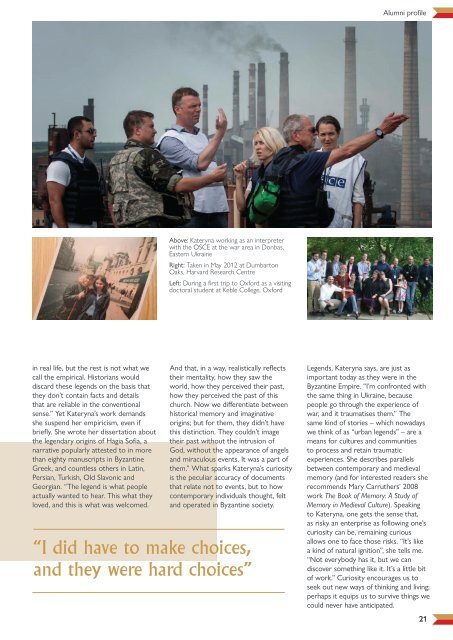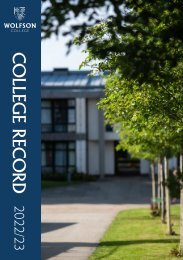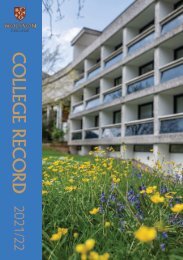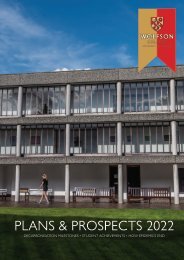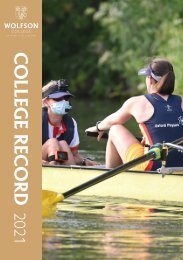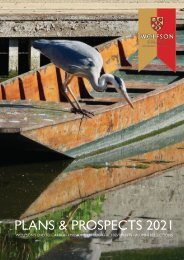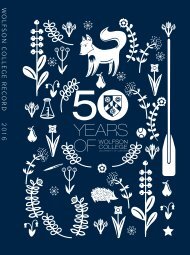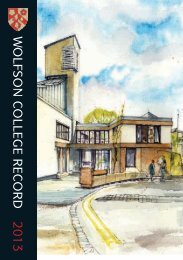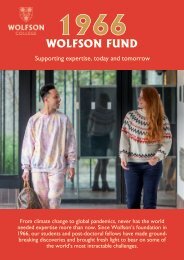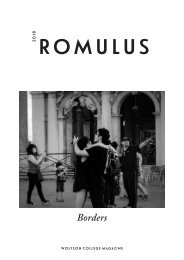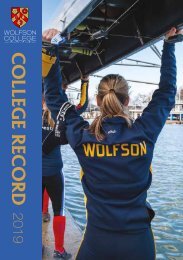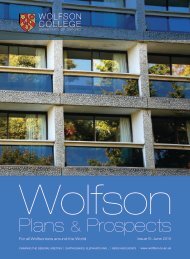Plans & Prospects 2023
Plans & Prospects is the annual magazine for alumni and friends of Wolfson College at the University of Oxford. We hope that you enjoy reading about life here at Wolfson, and welcome your feedback or article suggestions for next year's issue.
Plans & Prospects is the annual magazine for alumni and friends of Wolfson College at the University of Oxford. We hope that you enjoy reading about life here at Wolfson, and welcome your feedback or article suggestions for next year's issue.
You also want an ePaper? Increase the reach of your titles
YUMPU automatically turns print PDFs into web optimized ePapers that Google loves.
Alumni profile<br />
Above: Kateryna working as an interpreter<br />
with the OSCE at the war area in Donbas,<br />
Eastern Ukraine<br />
Right: Taken in May 2012 at Dumbarton<br />
Oaks, Harvard Research Centre<br />
Left: During a first trip to Oxford as a visiting<br />
doctoral student at Keble College, Oxford<br />
in real life, but the rest is not what we<br />
call the empirical. Historians would<br />
discard these legends on the basis that<br />
they don’t contain facts and details<br />
that are reliable in the conventional<br />
sense.” Yet Kateryna’s work demands<br />
she suspend her empiricism, even if<br />
briefly. She wrote her dissertation about<br />
the legendary origins of Hagia Sofia, a<br />
narrative popularly attested to in more<br />
than eighty manuscripts in Byzantine<br />
Greek, and countless others in Latin,<br />
Persian, Turkish, Old Slavonic and<br />
Georgian. “The legend is what people<br />
actually wanted to hear. This what they<br />
loved, and this is what was welcomed.<br />
And that, in a way, realistically reflects<br />
their mentality, how they saw the<br />
world, how they perceived their past,<br />
how they perceived the past of this<br />
church. Now we differentiate between<br />
historical memory and imaginative<br />
origins; but for them, they didn’t have<br />
this distinction. They couldn’t image<br />
their past without the intrusion of<br />
God, without the appearance of angels<br />
and miraculous events. It was a part of<br />
them.” What sparks Kateryna’s curiosity<br />
is the peculiar accuracy of documents<br />
that relate not to events, but to how<br />
contemporary individuals thought, felt<br />
and operated in Byzantine society.<br />
“I did have to make choices,<br />
and they were hard choices”<br />
Legends, Kateryna says, are just as<br />
important today as they were in the<br />
Byzantine Empire. “I’m confronted with<br />
the same thing in Ukraine, because<br />
people go through the experience of<br />
war, and it traumatises them.” The<br />
same kind of stories – which nowadays<br />
we think of as “urban legends” – are a<br />
means for cultures and communities<br />
to process and retain traumatic<br />
experiences. She describes parallels<br />
between contemporary and medieval<br />
memory (and for interested readers she<br />
recommends Mary Carruthers’ 2008<br />
work The Book of Memory: A Study of<br />
Memory in Medieval Culture). Speaking<br />
to Kateryna, one gets the sense that,<br />
as risky an enterprise as following one’s<br />
curiosity can be, remaining curious<br />
allows one to face those risks. “It’s like<br />
a kind of natural ignition”, she tells me.<br />
“Not everybody has it, but we can<br />
discover something like it. It’s a little bit<br />
of work.” Curiosity encourages us to<br />
seek out new ways of thinking and living;<br />
perhaps it equips us to survive things we<br />
could never have anticipated.<br />
21


